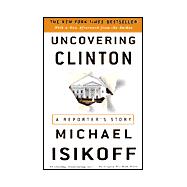
Note: Supplemental materials are not guaranteed with Rental or Used book purchases.
Purchase Benefits
Looking to rent a book? Rent Uncovering Clinton : A Reporter's Story [ISBN: 9780609805589] for the semester, quarter, and short term or search our site for other textbooks by Isikoff, Michael. Renting a textbook can save you up to 90% from the cost of buying.
| Introduction | xiii | ||||
| Book One PAULA JONES February 1994--May 1994 | 1 | (98) | |||
|
3 | (15) | |||
|
18 | (21) | |||
|
39 | (14) | |||
|
53 | (25) | |||
|
78 | (21) | |||
| Book Two KATHLEEN WILLEY September 1996--August 1997 | 99 | (66) | |||
|
101 | (24) | |||
|
125 | (16) | |||
|
141 | (24) | |||
| Book Three MONICA LEWINSKY August 1997--December 1997 | 165 | (94) | |||
|
167 | (11) | |||
|
178 | (11) | |||
|
189 | (21) | |||
|
210 | (19) | |||
|
229 | (11) | |||
|
240 | (19) | |||
| Book Four KEN STARR December 1997--January 1998 | 259 | (91) | |||
|
261 | (12) | |||
|
273 | (8) | |||
|
281 | (9) | |||
|
290 | (6) | |||
|
296 | (13) | |||
|
309 | (30) | |||
|
339 | (11) | |||
| Epilogue ``We are scum.'' | 350 | (9) | |||
| Afterword In the matters of Julie Hiatt Steele, James Riady, and Linda Tripp | 359 | (18) | |||
| Notes on Sources and Methods | 377 | (3) | |||
| Notes | 380 | (33) | |||
| Acknowledgments | 413 | (2) | |||
| Index | 415 |
The New copy of this book will include any supplemental materials advertised. Please check the title of the book to determine if it should include any access cards, study guides, lab manuals, CDs, etc.
The Used, Rental and eBook copies of this book are not guaranteed to include any supplemental materials. Typically, only the book itself is included. This is true even if the title states it includes any access cards, study guides, lab manuals, CDs, etc.
Excerpted from Uncovering Clinton: A Reporter's Story by Michael Isikoff
All rights reserved by the original copyright owners. Excerpts are provided for display purposes only and may not be reproduced, reprinted or distributed without the written permission of the publisher.